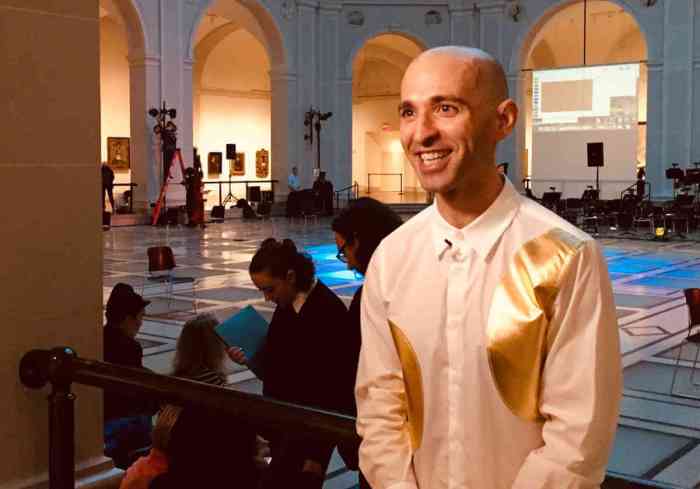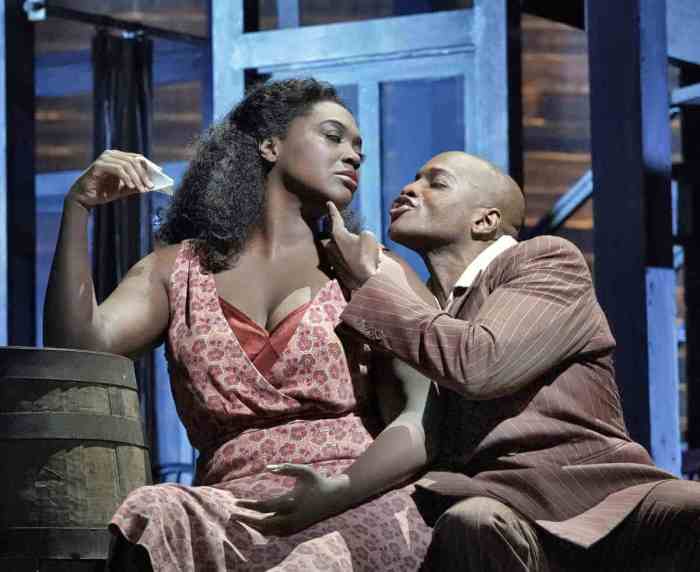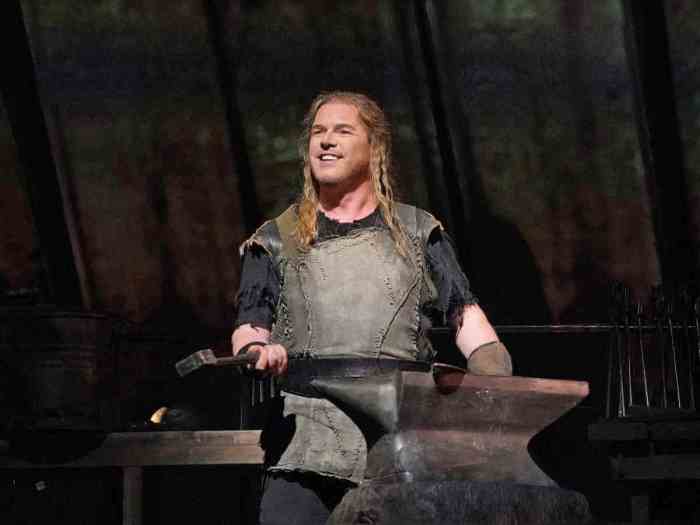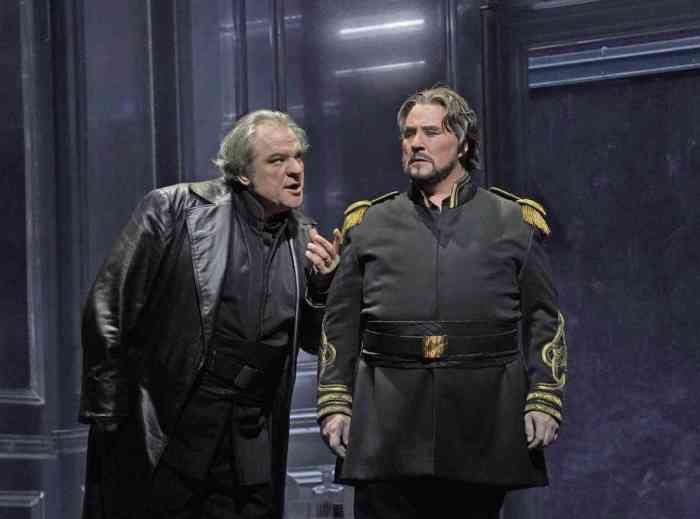Pretty Yende in the Julie Taymor production of Mozart’s Mozart’s “Die Zauberflöte.” | MARTY SOHL/ METROPOLITAN OPERA
After a grueling, spiritually exhausting summer of labor negotiations, the Metropolitan Opera has gotten back to work presenting revivals of repertory standards. In many ways, these are better indicators of the company’s current health than the new production of “Le Nozze di Figaro” that opened the season. Sir Richard Eyre’s elaborately busy yet tired staging already feels like a revival, with uneven casting and forced, routine stage business.
Puccini’s La Bohème” has recently become the vehicle of choice for introducing new artists onto the Met roster. The cast scheduled for the September 29 performance headlined rising young singers on the international scene — Bryan Hymel, Quinn Kelsey, Myrtò Papatanasiu. But the withdrawal of Ekaterina Scherbachenko brought back a familiar veteran to join the newcomers. Hei-Kyung Hong has been singing Mimì at the Met since 1987, yet her performance radiated a youthful freshness and ageless beauty that set her apart. Hong’s singing had a cameo-like delicacy and fineness of detail, the soft elegiac timbre evoking tenderness and melancholy. Her manner was reserved with underlying depths of feeling.
In contrast, Hymel portrayed an outgoing Rodolfo — high spirited and full of boyish ardor. His tenor initially sounded dry and wooden in the middle with easy but disconnected high notes. By Act II, his burly rangy tenor developed more lyric flow and warmth. Kelsey, a star Verdi baritone on European stages, was luxury casting as Marcello — the tone rich and imposing yet full of youthful sap. Hopefully in future seasons Kelsey and Hymel will be given opportunities to shine in more heroic repertory.
In new Met season, repertory standards are the stand-outs
The rest of the cast was routine. In a disappointing debut, Papatanasiu’s raven-haired spitfire Musetta looked more glamorous than she sounded; hollow middle voice alternated with squally high notes. David Soar’s ordinary comprimario level Colline and Donald Maxwell’s faded Benoit and Alcindoro were inexplicably imported for roles easily cast with superior local talent. Conductor Riccardo Frizza has a predilection for perversely arbitrary tempo changes and too often drowned out the singers, but the orchestra played gloriously for him.
The revival of “Carmen” (scheduled for an HD showing on November 1) starred the by now familiar gypsy of Anita Rachvelishvili surrounded by local role debuts. Rachvelishvili has refined her vocal interpretation — her earthy, powerful mezzo has been scaled back for greater Gallic elegance and ductility. The more lyrical approach results in easier, better integrated high notes but there is a loss of visceral excitement. I wish she would steer herself away from predictable slutty stage business — wide-open legs and unconvincing dry-humping and tussling on the floor. As I imagine her, Carmen doesn’t throw herself at men but coolly makes them come crawling to her.
As her Don José, Aleksandrs Antonenko, another Slavic vocal heavyweight, seemed overly loud and graceless in Acts I and II. His voice is uninteresting at less than full tilt. But as Don José got angrier and more desperate in the last two acts, his trumpet tone rang out with appropriate force. Antonenko’s lumbering, glowering stage demeanor also robbed the character of romantic vulnerability but proved effective in the final confrontation.
Anita Hartig’s winsome Micaela pleased the audience by virtue of elegant musicianship and good French diction, her tone taut but vibrant. Massimo Cavalletti’s Escamillo was decently sung with a smooth but bland baritone that lacked dash. Kiri Deonarine’s brightly soaring Frasquita added sparkle to the ensembles. After rushing through the prelude, rising podium star Pablo Heras-Casado’s energetic, forward moving tempos didn’t preclude sensitivity to orchestral detail and nuance.
The October 6 season premiere of Mozart’s “Die Zauberflöte” was strongly cast but undercut by technical problems in the pit and backstage. The popular Julie Taymor production has been seen to better advantage — lack of rehearsal was evident in badly timed scene changes and light cues, incorrect musical entrances, drops that got stuck on set pieces, and poorly executed puppetry. For a production so focused on visual effects and spectacle, this is a liability. Adam Fischer’s conducting was a prosaic race through the score with little fantasy or profundity — accurate and professional but flat.
The star of the evening was the radiant Pretty Yende as Pamina — her rich glowing soprano soaring through the testing high-lying phrases while her simple, generous yet dignified portrayal won all hearts. Her “Ach, ich fühl’s” would have benefited from a tempo that allowed her to float and spin the vocal line. Yende’s German pronunciation could use some work but the audience didn’t care — she got the biggest ovation at the final bows.
Toby Spence sounded bright and lyrically refined as Tamino, acting with purpose and resolve — he seems to be fully recovered from thyroid cancer surgery in 2012. René Pape, hidden behind Sarastro’s kabuki makeup and bulky costume, rolled out velvety legato phrases with only a little weakness on the lowest notes. Ryan McKinny’s Speaker was also burdened by a costume that wore him and his pleasant baritone lacks gravitas. Markus Werba’s Austrian homeboy Papageno showed off a sexy swagger and a lusty baritone, and he added little improvisatory touches that enlivened the bird catcher’s familiar comedic shtick.
Ana Durlovski, in her Met debut as the Queen of the Night, has one of the strangest coloratura voices I have heard. Her darkened, covered middle register sounds exactly like the mezzo Brigitte Fassbaender morphing into a laser-like heady placement in the upper register. She nailed all five high F’s — her scales were sketchy in her entrance aria but the staccati in the vengeance aria were eerily accurate.
The technical and musical problems in this “Flute” should sort themselves out with repetition.


































